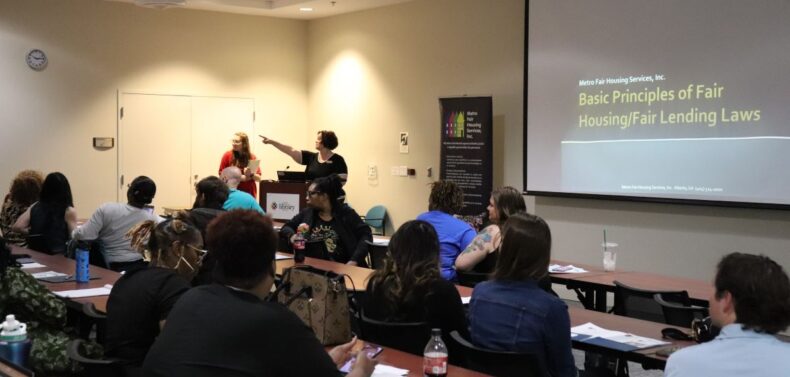Organizations that have protected Americans from housing discrimination since 1968 are under dire threat as the Trump administration guts watchdog agencies and attempts to pull funding from fair housing nonprofits across the country.
The federal Fair Housing Act makes it illegal to discriminate by denying someone a housing opportunity based on race, color, sex, national origin, disability, familial status or religion. The law remains in effect, but may no longer be enforced—at least not in the same way it has been for 57 years.
Metro Fair Housing Services, a nonprofit based in Atlanta, has been one of the primary groups protecting Northeast Georgians from housing discrimination since its founding in 1974. Like many similar nonprofits around the country, it gets most of its funding through a contract with the U.S. Department of Housing and Urban Development (HUD), the agency tasked with enforcement of the Fair Housing Act.
Small nonprofits like Metro Fair Housing Services process the vast majority of federal housing discrimination complaints in the U.S., with agencies like HUD contracting out most of the initial intake work to them. The National Fair Housing Alliance reports that in 2023, private nonprofits processed over 75% of these complaints, with HUD and the U.S. Department of Justice processing a little over 5% combined. Yet, these small nonprofits are being targeted by the Trump administration for budget cuts, putting their continued existence into question.
Gail Williams, executive director for Metro Fair Housing Services, told attendees at a housing rights forum at the ACC Library last month that her entire federal contract, along with 77 similar contracts across the country, was pulled suddenly in February. “I got an email from HUD saying that our contract to administer fair housing activities in seven counties surrounding Fulton was terminated. They terminated 78 contracts across the country with that same email,” Williams said.
A federal judge issued a temporary restraining order to reinstate the grants on Mar. 26, but the order was overturned on Apr. 14, according to Williams. That leaves the contract in place for now, but the Trump administration has the power to withdraw it again at any moment. The affected fair housing organizations are appealing the decision and are hopeful it will be heard as early as the first week of May.
Metro Fair Housing Services is one of four private fair housing organizations in Georgia, and is one of only two such groups that are funded with a private enforcement initiative grant from HUD. The grant provides about $425,000 each year, which accounts for over half of Metro Fair Housing Services’ budget. Losing this grant would be “devastating,” according to Williams, and could force Metro Fair Housing Services to close down.
“It’s 53% of my budget; you do the math,” Williams told Flagpole. “We would either be closed or severely downsized. We are trying to figure out how we could stay open and still serve the 2.6 million people in our target area.”
The closure of Metro Fair Housing Services would leave North Georgia much more vulnerable to housing discrimination because there is no other organization that could easily take its place. While the Georgia Commission on Equal Opportunity is still available as a resource for those who feel they have been discriminated against, this state agency is not a full-service fair housing agency and does not provide housing counseling or financial literacy classes. It also does not do housing discrimination testing for enforcement purposes, which is an important tool in discrimination investigations.
The Fair Housing and Equal Opportunity Division of HUD is also available nationwide to take discrimination complaints, but this federal agency has been targeted by budget cuts and layoffs from DOGE. The administration’s initial plan was to lay off 77% of the government employees in HUD who enforce the Fair Housing Act. It’s unclear how many of these employees will eventually be out of work, but HUD is currently considering closing dozens of field offices and even some of its regional hubs.
The chaos in the federal government has started to interfere with Metro Fair Housing Services’ work, which includes 34 active discrimination cases currently filed with HUD. “It’s a hot mess,” Williams said. “They were already backlogged and behind before all of this started. The layoffs will make this work difficult even if we keep our [federal] contracts in place.”
The Trump administration has also revoked President Joe Biden’s “Affirmatively Furthering Fair Housing” rule which required localities and public housing authorities to track instances of discrimination and to take steps to address them. Going forward, each community will be able to decide for itself the extent to which it will enforce the Fair Housing Act, giving discrimination a chance to grow and take root in some areas.
However, ACC Housing and Community Development Department Director Melinda Lord told the audience at the library last week that HCD will continue to address discrimination regardless of the actions of the Trump administration. “There seems to be a push to minimize fair housing issues and concerns. We’re not going to follow suit,” Lord said. “We are going to continue to do our due diligence to share with the community what their rights are and what actions you can take to try to mitigate [discrimination].”
Cases of discrimination happen regularly in Georgia and across the country, caused by small landlords and large corporations alike. Bank of America, for example, was sued by a group of fair housing organizations in 2023 for alleged discriminatory practices in Atlanta and other cities, as they have been multiple times in the past.
“Discrimination is alive and well,” Williams told the library audience. “Unfortunately in this country, a child’s zip code has a lot to do with determining their access to opportunity and where they may end up in life.”
Like what you just read? Support Flagpole by making a donation today. Every dollar you give helps fund our ongoing mission to provide Athens with quality, independent journalism.









